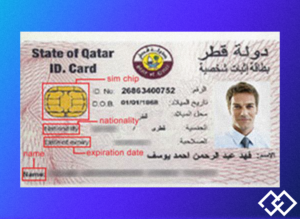Identity Review | Global Tech Think Tank
Keep up with the digital identity landscape.
On June 3, 2022, Qatar’s Ministry of Interior launched a new “Qatar Digital ID (QDI) Card” app. In its first phase, the app will help to verify the digital identity of residents in an effort to digitize accessing services on the Ministry’s website.
For years, Qatar has been aiming to digitally transform nationally, and this new service is one step towards the Ministry of Interior’s goals, “providing the latest and distinguished services to the citizens and residents.”
In 2007, Qatar’s government started to issue electronic smart cards, as opposed to conventional ID cards residents used. The smart card was biometric-enabled, meaning it included fingerprints and photographs of each individual’s face and eyes. Through the smart cards, Automated border control systems at Qatar’s national capital airport, Doha International Airport, could be accessed, as well as digital government services, immigration services, and applications and renewals of work visas.
At Doha in 2007, officials began distributing smart cards to nationals instead of conventional identity cards, with similar cards to follow for expatriates the next year. Driver’s licenses and health cards were not part of the smart card initiative, according to the Ministry of Interior’s strategic obstacles, but citizens in Qatar above 16 years old began to use this as their official national ID document.

Even before launching smart cards, Qatar’s government wanted to create a digital government program. Through Hukoomi, “an online portal providing information and e-services at the fingertips of those who live and work in Qatar,” government ministries and agencies were integrated to make the process of accessing a service more easily. Launched in 2003, the portal was then “upgraded” through collaboration between Thales, a service provider of electrical systems and security markets, and Qatar’s Supreme Council of Information and Communication Technology.
Gemalto eGov 2.0, designed by Thales, allowed a single sign-on (SSO) of all digital services on Hukoomi. Through simply using their smart cards, individuals could use a personal code as identification. This new version catered towards citizen needs, since SSO doesn’t require users to re-enter authentication.
To further digital transformation, the Ministry of Information and Communication Technology (ictQATAR) introduced Thales Government Digital Identity Services, which would help Qatar’s government maintain security of user access to services and make digital interactions in Qatar more efficient. Hukoomi 3 was launched in 2017, supporting portal access on mobile devices, and in 2018, the United Nations E-government Survey noted a high interaction index level. Additionally, the Ministry of Transport and Communications announced that since the implementation of Thales Government Digital Identity Services in Qatar in 2014, digital government services grew from 194 to 2,700.
The first phase of the recently launched Qatar Digital ID (QDI) Card comes with many updates: the app will store a digital wallet containing official cards and transactions, such as an individual’s “Qatari ID, driving license, and vehicle registration.” No date has been set by Qatar’s Ministry of Interior for Phase 2 of the app, but users can anticipate new services.
In 2013, Sheikh Abdullah bin Nasser bin Khalifa Al Thani, Qatar’s prime minister at the time, identified the development of digital government services as a priority in the nation. To address this, he formed a “Steering Committee” to develop national strategy, and as a result, Qatar’s e-Government 2020 strategy executive summary highlights a comprehensive vision: “All individuals and businesses will benefit from connecting online with Qatar’s more open and efficient government.” To promote Hukoomi, ictQATAR deployed kiosks in government agencies and public locations so residents could explore digital government services.
Similarly, Qatar National Vision 2030, a roadmap for future initiatives, has the aim to “transform Qatar into an advanced society capable of achieving sustainable development.” The recent launch of the Qatar Digital ID Card is creating more accessibility to government services, moving the country one step closer to this ambition in its digital identity transformation.
ABOUT THE WRITER
Katherine Zhang is a contributor to Identity Review from the University of California, Berkeley. Do you have information to share with Identity Review? Email us at press@identityreview.com. Find us on Twitter.
RELATED STORIES